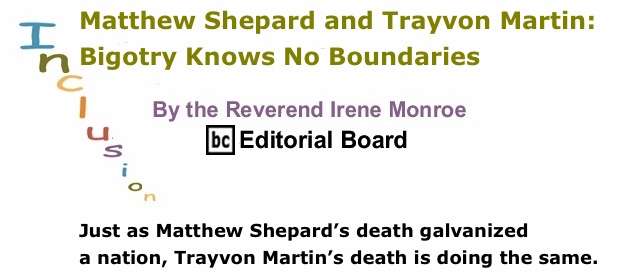


The nation is once again divided along the fault line of race. In a perceived 2013 post-racial society, however, William Faulkner’s prophetic quote “the past is never dead. It’s not even past” of the last century has come back to haunt us in this century.
Faulkner’s quote haunts us because of the recent verdict of the George Zimmerman trial.
The story, as you well know by now, of how George Zimmerman, a
neighborhood watch volunteer in a Florida community, was acquitted of
all charges - murder and manslaughter - related to Trayvon Martin.
Zimmerman’s actions resulted in the fatal shooting of Martin, a
17-year-old unarmed black teenager. Martin was perceived to be a
suspect because he was wearing the signature piece of clothing that
some associate with violent young black males - a hoodie. And he was
not only wearing it but also “walking while black” in a gated community.
With no
one of African descent - male or female - serving on the jury, the
nation, sadly, once again, has shown to be neither colorblind nor
post-racial. And the notion that an all-female, non-black jury would
render a fairer outcome than an all-male, non-black jury assumes racial
bias is gender-specific.
Just as racial bias isn’t gender-specific, it is also not
race-specific. Zimmerman is of a mix ethnic descent (mother’s Peruvian,
and father’s Jewish) who identifies as Hispanic.
The question many are still asking, however, even after the verdict, is whether Zimmerman was motivated by racism because he, too, is a person of color - therefore, was Zimmerman racially profiling Trayvon?
Racial, gender, gender-expression, and the all the other biases float freely through society - landing on all. Just because you’re a person of color or a member of an oppressed group doesn’t mean you don’t buy into stereotypes and racial and cultural attitudes. These themes inform our judgments and actions toward others as well as your own group. (Case in point: Supreme Court Justice Clarence Thomas.)
As a matter-of-fact, the bombardment of stereotypes has proven to have both subtle and unintended consequences toward people of different races, ethnicities, sexual orientation, class and religions, to name just a few. It’s not just regular people who succumb. Geraldo Rivera, a renowned Latino, stated that Trayvon wearing a hoodie was “as much responsible” for his death as Zimmerman’s pistol. Of course, Rivera later recanted.
A young man has become the symbol of the horrific result of such stereotyping, and is fast becoming the symbol for a movement. Just as Matthew Shepard’s death galvanized a nation, Trayvon Martin’s death is doing the same.
In 1998, both James Byrd Jr., and Matthew Shepard were victims of bias-motivated crimes. Byrd, an African American was murdered by three white supremacists who chained him to the back of their pick-up truck at his ankles and dragged along a three mile asphalt road until he was dismembered. Shepard was tortured, tethered to a fence and left to die because he was gay.
The Matthew Shepard and James Byrd Hate Crimes Prevention Act, also known as the Matthew Shepard Act, was passed. The measure expanded the federal hate-crimes law to include crimes motivated by a victim’s actual or perceived race, gender, gender identity, and sexual orientation, to name just a few.
With Florida’s stand your ground and self-defense laws permitting Zimmerman to walk without charges, the Shepard-Byrd statute not only reminds us of how bias-motivated crimes link gays and blacks together but that it’s the best hope for Trayvon Martin and his family seeking justice.

BlackCommentator.com Editorial Board member and Columnist, the Rev. Irene Monroe, is a religion columnist, theologian, and public speaker. She is the Coordinator of the African-American Roundtable of the Center for Lesbian and Gay Studies in Religion and Ministry (CLGS) at the Pacific School of Religion. A native of Brooklyn, Rev. Monroe is a graduate from Wellesley College and Union Theological Seminary at Columbia University, and served as a pastor at an African-American church before coming to Harvard Divinity School for her doctorate as a Ford Fellow. She was recently named to MSNBC’s list of 10 Black Women You Should Know. Reverend Monroe is the author of Let Your Light Shine Like a Rainbow Always: Meditations on Bible Prayers for Not’So’Everyday Moments. As an African-American feminist theologian, she speaks for a sector of society that is frequently invisible. Her website is irenemonroe.com. Click here to contact the Rev. Monroe.





